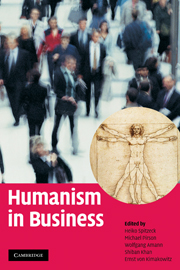Book contents
- Frontmatter
- Contents
- List of figures
- List of tables
- List of editors and contributors
- Acknowledgements
- Humanistic Management Network: paving the way towards a life-serving economy
- Introduction
- Part 1 Philosophic-historical grounding of humanism
- Part 2 Towards an integration of humanism and business on a systems level
- Part 3 Humanistic management
- 13 Democratizing the corporation
- 14 Social entrepreneurship: a blueprint for humane organizations?
- 15 Humanism at work: crucial organizational cultures and leadership principles
- 16 Positive organizational scholarship: embodying a humanistic perspective on business
- 17 Corporate sustainability as an indicator for more humanism in business? A view beyond the usual hype in Europe
- 18 Changing direction: corporations as ambassadors for the environment?
- Part 4 The individual as a change agent for a humane business society
- Index
- References
13 - Democratizing the corporation
Published online by Cambridge University Press: 25 January 2011
- Frontmatter
- Contents
- List of figures
- List of tables
- List of editors and contributors
- Acknowledgements
- Humanistic Management Network: paving the way towards a life-serving economy
- Introduction
- Part 1 Philosophic-historical grounding of humanism
- Part 2 Towards an integration of humanism and business on a systems level
- Part 3 Humanistic management
- 13 Democratizing the corporation
- 14 Social entrepreneurship: a blueprint for humane organizations?
- 15 Humanism at work: crucial organizational cultures and leadership principles
- 16 Positive organizational scholarship: embodying a humanistic perspective on business
- 17 Corporate sustainability as an indicator for more humanism in business? A view beyond the usual hype in Europe
- 18 Changing direction: corporations as ambassadors for the environment?
- Part 4 The individual as a change agent for a humane business society
- Index
- References
Summary
As the economic, environmental, and social footprints of multinational corporations MNCs have expanded, this influence has become a fact of life in the twenty-first century global economy. For champions of globalization, the rise of the MNC is cause for celebration. Job creation in poor countries, spreading innovation across borders, and building indigenous managerial talent are some of the rewards of MNC activity. For globalization skeptics, the picture, at best, is mixed. In their view, the borderless economy has intensified income disparities across and within countries, favored Northern firms at the expense of local entrepreneurs in part because of global trade rules, and accelerated the destruction of critical marine, forest, and atmospheric ecosystems as the culture of consumerism has fueled relentless demand for goods and services.
Within this unsettled landscape, the question of governance of MNCs has emerged as a pivotal issue among investors, civil society and government, and within MNCs themselves. The incongruity between the continued expansion of MNC scale and influence and the absence of a generally accepted governance framework is becoming increasingly evident. In a world where MNCs collectively are as economically and socially consequential as many national governments, what are the rules of accountability to harness MNC interests such that they serve the long-term public interest?
This core question has spawned a multitude of frameworks, principles, and norms to bring MNCs into alignment with societal expectations, including: the OECD Guidelines for MNCs, the OECD Principles for Corporate Governance, the World Bank's Global Corporate Governance Forum, the UN Global Compact, specialty organizations such as the Global Reporting Initiative (sustainability reporting) and AccountAbility (assurance standards), and investor-led initiatives such as the International Corporate Governance Network (corporate governance principles).
- Type
- Chapter
- Information
- Humanism in Business , pp. 229 - 247Publisher: Cambridge University PressPrint publication year: 2009
References
- 3
- Cited by



